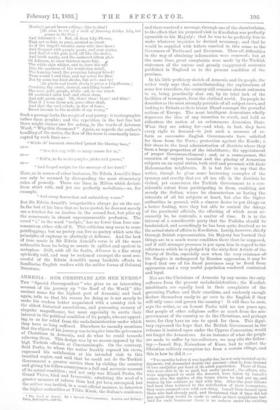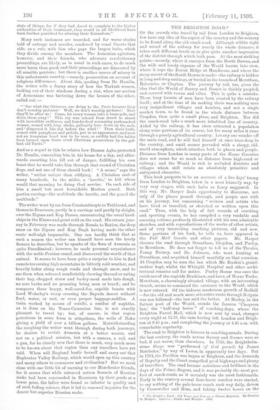ARMENIA. HER CHRISTIANS AND HER KURDS.* TEE "Special Correspondent" who
gives us an interesting account of his journey up "the Roof of the World" (the ancient name for the highest part of Armenia) and back again, tells us that his reason for doing so is not merely to make his readers better acquainted with a country rich in the oldest historical associations, and possessing scenery of singular magnificence, but more especially to excite their interest in the political condition of its people, who are appeal- ing to us for relief from the maladministration under which they have so long suffered. Elsewhere he casually mentions that the object of his of Christians journey was to inquire into the grievances
in Armenia, and do what he could towards relieving them. This design was by no means opposed by the high Turkish officials at Constantinople. On the contrary, Said Pasha, to whom the writer frankly exposed his views, expressed his satisfaction at his intended visit to this troubled region, and said that he could not do the Turkish Government a greater service than by visiting the country and giving his fellow-countrymen a full and accurate account of its actual condition ; and not only was Kiamil Pasha, the Grand Vizier, kind and favourable, admitting the need of a greater measure of reform than had yet been attempted, but the author was invited, in a semi-official manner, to interview the higher authorities at Yildiz Kiosk, the Sultan's residence, " The Lard of Ararat. By a Special Corro9pondent. London and Sydney: Eden, Remington, and 00.
and there received a message, through one of the chamberlains, to the effect that his proposed visit to Kurdistan was perfectly agreeable to his Majesty ; that he was to be perfectly free to make whatever inquiries he deemed necessary ; and that he would be supplied with letters couched in this sense to the Governors of Trebizond and Erzeroum. Thus all difficulties in the way of obtaining information were removed ; but at the same time, great complaints were made by the Turkish statesmen of the untrue and grossly exaggerated accounts' published in England as to the present condition of the province.
In his little prefatory sketch of Armenia and its people, the writer truly says that, notwithstanding the explorations of some few travellers, the country still remains almost unknown to us, being practically shut out, by its total lack of the facilities of transport, from the civilised world. Its people he describes as the most strongly patriotic of all subject races, and looking to Britain as their truest fiend amongst the powerful nations of Europe. The most intelligent Armenians wholly deprecate the idea of any intention to revolt, and hold as ridiculous the notion of an autonomous Armenian State. What they are asking for—and what, in fact, they have every right to demand—is just such a measure of re- form as successive English Governments have solicited for them from the Porte ; protection against the Kurds ; fair share in the local administration of districts where they form a large proportion of the inhabitants ; the appointment of proper Governors-General ; and, as a consequence, the cessation of unjust taxation and the placing of Armenian subjects on an equal status, both civil and personal, with their Alahommedan neighbours. It is but fair to say that the writer, though he gives some harrowing examples of the tyranny and cruelty that are all too rife in the districts he- visited, yet exonerates the Turkish Government to a con- siderable extent from participating in them, crediting not merely the Sultan, whom he characterises as having the- interests of all his subjects at heart, but also the higher authorities in general, with a sincere desire to put things on a better footing, were they but able to control the doings of the provincial officials, the effecting of which must ne- cessarily be, he contends, a matter of time. It is to the interest of a considerable party that the Pa.disha should be hoodwinked, and accordingly he has been quite deceived as to the actual state of affairs in Kurdistan. Lately, however, chiefly through British representation, his Majesty has learned that things are in a much worse condition there than he supposed, and if still stronger pressure is put upon him in regard to the reforms to which he is pledged by the sixty-first Article of the- Treaty of Berlin, especially now when the very existence of his Empire is endangered by Russian aggression, it may be hoped that one of his finest provinces may be freed from oppression and a very useful population rendered contented and loyal.
Nor are the Christians of Armenia by any means the only sufferers from the present maladministration ; the Kurdish inhabitants are equally loud in their complaints of the governing Pashas and their exactions, and curiously enough declare themselves ready to go over to the English if they will only come and govern the country ! It will thus be seen,. says the writer, as an honest Pasha told me ten years ago, that people of other religions suffer as much from the mis- government of the country as do the Christians, and perhaps more, for they have no one to speak for them. This digni- tary expressed the hope that the British Government in the reforms it insisted upon under the Cyprus Convention, would not forget the Armenians As an instance of what the people are made to suffer by tax-collectors, we may cite the follow- ing :—Ismail Bey, Kaimakam of Maus, had to collect the Christian military exemption tax from a certain village, and this is how he did it :—
"Two months before it was legally due, he not only insisted on its. payment, but demanded double the amount—that is, four instead of two medjidies per head of its adult population. Those of them who were able to do so paid, but under protest ; the others, -who were unprepared to meet the demand, were taken by Ismail's. orders into the stables of the house where he had put up, andi beaten by the soldiers he had with him. After the poor fellows had been thus tortured to the satisfaction of their tormentors, they were smeared over with cow-dung. Ismail then turned upon those who had already paid, and threatened that if they did not pay again they would be made to suffer as their neighbours had.. And for such treatment there is no redress under the existing state of things, for if they had dared to complain to the higher authorities of their treatment, they would in all likelihood have been further punished for abusing their Kaimakam."
Many such instances are recorded, and far worse stories told of outrage and murder, condoned by venal Courts that side, as a rule, with him who pays the largest bribe, which they divide among the members. The Armenian agitators, however, and their friends, who advocate revolutionary proceedings, are likely, as is usual in such cases, to do much more harm than good, and their proceedings are disavowed by all sensible patriots ; but there is another source of misery in this unfortunate country.—namely, persecution on account of religious differences. About this, quoting from Dr. Hamlin, the writer tells a funny story of how the Turkish women, looking out of their windows during a riot, when one section of Armenians was battering down the houses of the other, called out :—
"‘ See what the Ghiaours are doing to the Preis because they 'don't worship pictures Well, we don't worship pictures ! Next they'll be after us ! Come, let every woman take a bean-pole, and drive them away ! ' This cry was echoed from street to street with incredible swiftness, and hundreds of screaming yashmacked women, armed with long sticks, gallantly bore down on the mob, and 'dispersed it like fog before the wind ! ' Then their lords, armed with yataghans and pistols, put in an appearance, and soon not an Armenian head was to be seen, so swiftly had the tables been turned upon those cruel Christian persecutors by the gal- lant old Turks."
And as a sequel to this he relates how Hassan Agha protected Dr. Hamlin, concealing him in his house for a day, and after- wards escorting him till out of danger, fulfilling his own boast that he would take him through that crowd of Christian 'dogs, and not one of them should bark ! "A scene," says the writer, "rather unique than edifying. A Christian mob of many hundreds. In the midst, a heretic,' to kill whom would that morning be doing God service. On each side of him a small but most formidable Moslem guard. Both parties cursing—the multitude the heretic, and the guard the multitude."
The writer went by sea from Constantinople to Trebizond, and thence to Erzerourn, partly in a carriage and partly by sleighs, over the Zigana and Kop Passes, encountering the usual hard- ships in the Khans and great cold on the road. His return jour- ney in February was made through Russia to Batiim, the deep snow on the Zigana and Kop Dagh having made the other route well-nigh impassable. One can hardly think that at such a season the writer can himself have seen the lovely flowers he describes, but he speaks of the flora of Armenia as quite Paradisaical ; however, he made personal acquaintance with the noble Persian camel, and discovered the worth of that animal. It seems to have been quite a surprise to him to find camels traversing high mountains in bitterly cold weather, and heavily laden along rough roads and through snow, and to eee them when released comfortably chewing the cud or eating their hay, chopped straw and barley-meal made into dough, no sore backs and no groaning being seen or heard ; and he compares these happy, well-cared-for, capable beasts with Lord Wolseley's troop crossing the Bayuda desert without food, water, or rest, or even proper baggage-saddles. A train worked by means of astalki, a residue of naphtha, as is done on the Trans-Caucasian line, is not exactly pleasant to travel by ; but, of course, in that region petroleum in some form is ubiquitous, the wells of Baku giving a yield of over a billion gallons. Notwithstanding the roughing the writer went through during both journeys, fhe desires to revisit Armenia at a better season, and not on a political mission, but with a camera, a rod, and a gun, for he clearly sees that there is much, very much more to be known about that region than any travellers have yet told. When will England bestir herself and carry out that Euphrates Valley Railway, which would open up this country and many others to commerce and civilisation P But we must close with one little bit of warning to our Manchester friends, 'for it seems that while coloured cotton flannels of Russian make had been superseded in Erzeroum by their goods at a tower price, the latter were found so inferior in quality and of such fading colours, that it led to renewed inquiries for the .dearer but superior Russian make.



































 Previous page
Previous page